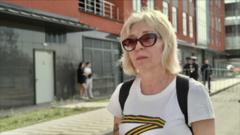Russian airports are facing significant delays, affecting about 60,000 travelers due to Ukrainian drone attacks. Meanwhile, drone assaults in Ukraine have resulted in casualties, complicating peace discussions as a ceasefire coincides with upcoming commemorations in Moscow.
Ukrainian Drone Attacks Leave 60,000 Russian Passengers Stranded

Ukrainian Drone Attacks Leave 60,000 Russian Passengers Stranded
A recent wave of Ukrainian drone strikes has caused extensive travel disruptions across Russia, impacting air travel for tens of thousands of passengers.
At least 60,000 air travelers have found themselves stranded at various airports across Russia following extensive drone attacks attributed to Ukraine, according to local officials. The Russian Association of Tour Operators (Ator) reported that approximately 350 flights were disrupted since Tuesday evening in major Russian cities including Moscow, St Petersburg, and Sochi. The Russian defense ministry claims that 524 Ukrainian drones were brought down in a 24-hour period, a figure that, if verified, would set a new record.
In a counter-offensive to the drone strikes, Ukrainian officials claim that a Russian drone and missile attack overnight claimed the lives of two individuals in Kyiv. This escalation in violence occurs as Russia declared a three-day ceasefire ahead of a military parade intended to commemorate World War Two victories on May 9. Ukraine has dismissed this ceasefire proposal as mainly performative, reiterating demands for an unconditional 30-day truce, which aligns with sentiments from its European and American allies.
On the ground in Russia, significant airport disruptions were reported, particularly in Moscow's three major airports—Vnukovo, Sheremetyevo, and Domodedovo—where 110 flights were canceled. Moscow's Mayor, Sergei Sobyanin, noted that 19 drones had been intercepted near the city since the start of the attacks, while St Petersburg faced similar struggles with 55 flights either canceled or delayed. Footage from Pulkovo airport depicted long lines of planes stranded on the runway, with passengers waiting extensively to disembark.
The air traffic chaos in Russia coincided with the arrival of Chinese President Xi Jinping in Moscow for the upcoming military commemoration. Reports indicate a plane carrying Serbian President Aleksandar Vucic had to divert to Baku due to drone threats, coupled with claims that both Latvia and Lithuania denied him passage through their airspace. Slovak Prime Minister Robert Fico pointed out difficulties faced in traversing airspace due to Estonia's refusal to allow his overflight, citing disruptions to his travel schedule.
As Russia prepares to host as many as 27 foreign leaders for the parade, tensions remain high. U.S. Vice-President JD Vance acknowledged the need for dialogue between Russia and Ukraine, though he criticized Moscow's demands for an end to hostilities as excessive. On the frontlines, Ukrainian President Volodymyr Zelensky urged the international community to bolster pressure on Russia following the lethal drone conflict that claimed lives in Kyiv.
The ongoing war has provoked intense international scrutiny, and Zelensky previously warned against any foreign involvement in Moscow’s commemorative events, highlighting that foreign troops’ participation would only serve to endorse Russia's military aggression. Meanwhile, China's prominent role in the parade, with 102 military personnel participating, further complicates the geopolitical landscape.
Victory Day in Russia, celebrated to commemorate the Red Army's victory over Nazi Germany, is a significant and symbolic occasion. As tensions rise, both Kyiv and European officials firmly reject Putin's narrative of liberation, deeming the invasion and occupation a blatant violation of sovereignty rather than an act of support for freedom. Meanwhile, Europe observes Victory in Europe Day with a starkly different historical context.


















